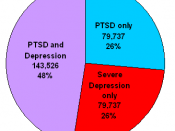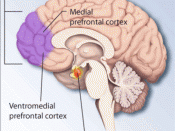Recovery: Post Traumatic Stress Disorder by David Kinchin www.burnsurvivorsttw.com/ptsdrecov1.html The most common question asked by PTSD (Post Traumatic Stress Disorder) survivors is ?When will I get better?? However with PTSD there are no such readily identifiable stages of recovery, each individual?s progress will be different.
PTSD survivors find themselves on a game board. The game? Snakes and ladders. A series of ladders helps the person towards the recovery, but the person may hit a snake that will send them back to their previous anguish and turmoil.
The Snakes and Ladders Model Recovery On square one the recovery begins. Some may only have to roll 4 times to make it to the end. This represents 4 weeks of recovery. Some may never roll the correct number on the dice to finish on square 100, or may walk away taking more traumas with them. Tragically a few people may never finish the game.
A person can finish the game in 4 rolls, or can be taken back 94 squares in just 6 moves. This analogy is probably more realistic then the very simple idea that recovery is a case of two steps, forward and then one step back. Recovery is neither easy nor smooth.
Examples of Snakes and Ladders Ladders: 1. Good Medication can be seen as an essential aid for recovery. The withdrawal of medication can soon become a ?snake?.
2. Therapy, relaxation techniques can be practiced, realization that there is a ?trauma bond? which exists between those who have suffered before, and individual or group support is an essential part of recovery.
Snakes 1. Panic attacks.
2. Depression can occur at any time. It can cause the survivor to walk away at anytime. This is the most dangerous snake of all.
3. Alcohol & non-prescribed drugs.
4. Adverse publicity can heighten the state of a survivor?s feelings of guilt.
5. Anniversaries are often obstacles. However, they can also be turned into a good thing towards recovery.
6. Non-acceptance of PTSD by professionals.


